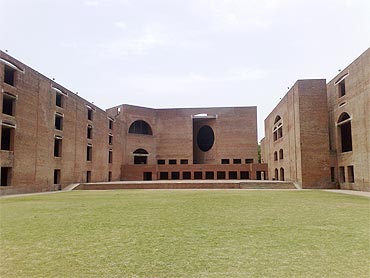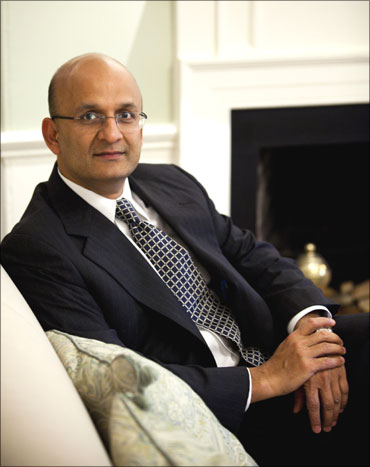 | « Back to article | Print this article |
Rashmi Bansal: Happy New MBA
Here, she asks if there is a vision behind producing MBAs in tier-3 B-schools in tier-2 towns.
My cousin called to wish me 'Happy New Year'.
When I asked about her daughter, a first year student at a local B-school, her quick comment was, "Koi ladka nazar mein ho to bataana (Let me know if you know of any good prospect for my daughter)."
Hey bhagwaan, aur koi bhi request I am game for. Yeh kaam mujhse nahin hoga. (Oh god, I'm not game for such requests. I can't do this).
"Won't she work a year or two before marriage?" I asked.
"Main to chahti hoon par uske papa ne mana kar diya hai (I want my daughter to continue studying, but her father rejected my proposal)."
This is not a stray case. Or an unusual one. The tier-3 B-schools in tier-2 towns are full of such girls. Whether in management or in engineering, they are pursuing education for the sake of a 'degree'.
Almost like an eligibility certificate to get a 'good match'.
The girl herself may wish to work. At least for some time. But she is resigned to the fact that it may not be possible. Before marriage, her father and brothers will decide if she can. After marriage, her husband and in-laws will decide the same.
So that effectively eliminates 48 per cent of the population in these tier-3 B-schools. Which unlike top schools, have a pretty even boy:girl ratio.
Now all their exposure to concepts of marketing, HR, finance and blah blah blah, is basically of no use. Because if, by pull-push-pleading-and-prayer, a few companies do drop by for placement, 90 per cent will flunk the interview.
Because they are dumb, and I do not mean in terms of intelligence.
Rashmi Bansal, the author of the bestsellers Stay Hungry Stay Foolish and Connect the Dots, writes on youth, careers and entrepreneurship. You can reach her at mail@rashmibansal.in
The Silent Killer
"No ma'am," a student explained later."People have many questions, but they are afraid to ask."
Afraid?
"You speak such good English no, ma'am. They can't speak like that. So they stay quiet."
But all the students have passed the state entrance test and taken admission, isn't it?
"Yes, but that is written only no, ma'am."
Well, your English seems pretty good...
"I went to a convent school, ma'am. There aren't many students like me here."
So how do the students follow what is being taught in class?
"The teachers explain in local language, ma'am."
My head started reeling. MBA subjects being taught in Telugu or Gujarati or what have you. I don't have anything against these languages but then how in the world will this help students?
Without ability to communicate in the universal business language of English, they will never get decent jobs. It doesn't matter how many rules AICTE makes and how many speeches Kapil Sibal gives on excellence in education. It's all bah humbug.
But then, what is the way forward?
A comedy of aspiration, a tragedy of education
While IIM-A and IIM-C looked to Harvard and Sloan respectively for guidance and inspiration, Indian B-schools look up to the IIMs. What they have taken from these institutes is the external framework of an 'MBA'.
The idea of an entrance exam, a list of subjects to be taught, the carrot of placements. And, of course, free (and mostly unfair) use of hyperbolic product promise such as 'world class', 'professional environment' and 'fantastic carrier start' (this is a real claim made by a real B-school in the national capital).
And in the midst of this circus -- a comedy of aspiration, a tragedy of education -- we have the AICTE. The All India Council for Technical Education which has issued (yet another) set of ill-advised rules applicable to all PGDM courses.
These include gems like:
1. All PGDM courses shall be of duration not less than 24 months. (Why? Even IIM PGDM is technically not for 24 months).
2. Model curriculum/ syllabus will be issued by the Council. (Great -- but what about upgrading quality of teaching and teachers?)
3. Admission to PGDM courses will be conducted by the respective state governments through the competent authority designated for such purpose. (That still doesn't ensure students who get admitted have the minimum competence required to do MBA in a meaningful manner).
We can start solving the problem, only if we at least admit to its existence.
If it's broke, fix it!
Not a single student from a tier-3 school will get a hardcore finance job
Next, realistically prepare students land in the industry feet-first. Train for the kind of jobs they will be expected to do.
Not a single student from a tier-3 school will get a hardcore finance job, yet 90 per cent claim that is where their interest lies. Fine. You can fulfil their aspirations, but in a direction different from what IIM students are taking.
Train your students to truly understand the stock market -- let them find work with brokers. Brokers don't care much for which B-school you are from. Heck, they don't even care much for an MBA degree! As long as you produce results, or help the company to.
Most importantly, train your students to be good salesmen. Because there is always a demand for that breed of people, across industries. Sales is not a lowly job, it requires a high degree of skill and intelligence.
The best marketing companies -- such as HUL -- insist on management trainees working as salesmen for a good 12 to 18 months, before making them 'brand managers'. If managers must take the sales route, it follows that a good salesman can develop into a manager.
Yes, the truth is tier-3 graduates may get the designation of 'officer' or 'executive' or even 'manager' but the actual job content may not be managerial. Or, what we have understood to be the job of a manager, thanks to the MBA.
But guess what, majority of IIM graduates have the same problem. Yeh MBA ka syllabus hi kuch aisa hai (That's the basic flaw with the MBA syllabus). When you discuss a case, it's from the perspective of the CEO, not the trainee!
It's everybody's problem, really.
Even the 'market leaders' cannot afford to sit smug
Does the two year MBA justify the investment? While Ivy League schools retains leadership in the space Nohria admits, 'You need to worry when the health of the whole field doesn't look promising, even when you are at the top.'
After discussions with 200-plus HBS faculty members and nearly as many staff, students, alumni, business leaders, and other educators, Nohria discerned a consistent theme: 'Harvard Business School is at an inflection point'.
It's interesting to note that when HBS was founded in 1908, America was hit by a banking crisis and general loss of faith in business. 'It was a moment when there was a need to come up with a different vision of how business leaders would operate,' Nohria said.
'Harvard Business School was created to fulfill that vision. Now, many people are asking the question, can we do the same for the next 100 years?'
It is a question IIMs need to ask themselves, as much as HBS.
Wishing all MBAs, aspiring-to-be-MBAs and the rest of humanity a very happy new decade.
May we all turn the spotlight inwards, and find the guru within.




